- Work3 - The Future of Work
- Posts
- Future of Work in 2024 – Latest Scores
Future of Work in 2024 – Latest Scores
The seven battles that defined the year
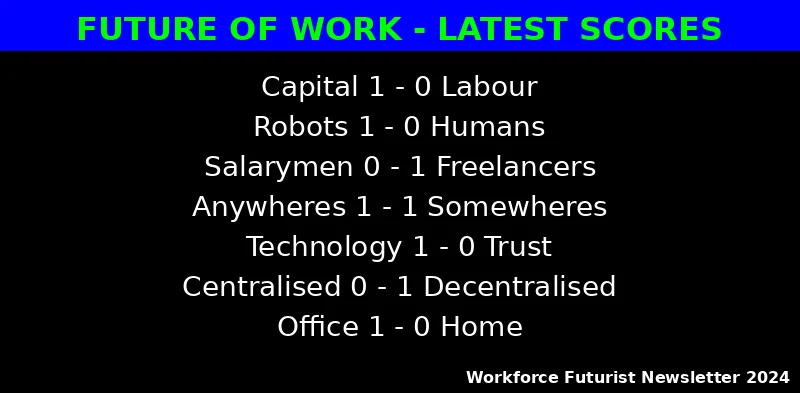
2024 was a year of power struggles—not just in the workplace, but globally.
With nearly half the world voting in critical elections, the balance of power between governments, citizens, and institutions shifted dramatically. These changes weren’t confined to politics; they echoed through workplaces, boardrooms, and digital platforms, shaping the future of how we work, live, and govern ourselves.
This review breaks down the seven key power dynamics that defined the year, drawing on the stories, trends, and articles that captured these upheavals. From layoffs and decentralised workforces to questions of trust and technology, the shifts in power at work mirror the political transformations we’ve witnessed globally.
In this review, we’ve broken down the key dynamics of the year:
⛗ Capital 1 - 0 Labour – Mass layoffs masked by the dubious ‘AI inside’.
🤖 Robots 1 - 0 Humans– ChatGPT’s rise and its impact on knowledge work.
🧑💼 Salarymen 0 - 1 Freelancers – More freelancers flood the market keeping rates low.
🌎 Anywheres 1 - 0 Somewheres – Remote work vs. location-based jobs.
🤳🏽 Technology 1 - 0 Trust – Who controls the apps we rely on?
🤳🏽 Centralised 0 - 1 Decentralised – A liquid workforce challenges the need for a large centralised workforce.
🏠 Office 1 - 0 Home – The RTO mandates that left remote advocates reeling.
Let’s take a closer look. Scroll down so you can sign-up for our free webinar next week, ‘The Big Questions for Work in 2025’.
Capital 1 - 0 Labour
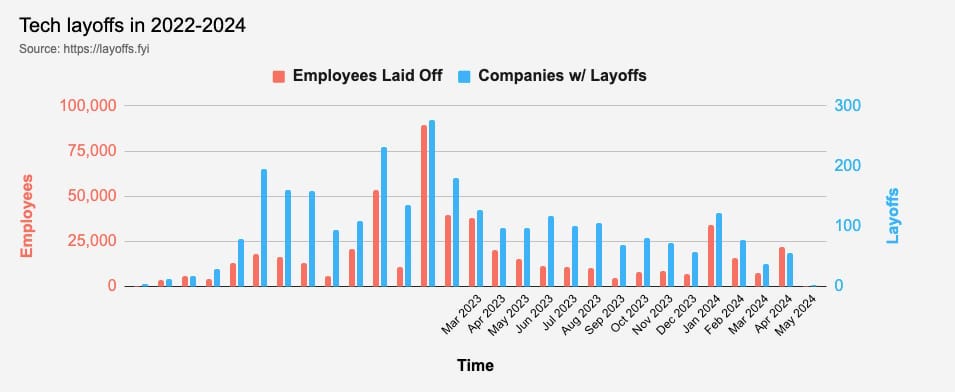
Mass layoffs in 2024 became the dominant narrative, with ‘AI optimisation’ often cited as a convenient justification. The reality is that larger companies have over-hired in the past. The acceleration of technology automation (not just AI) is important, and also the freelancer market is more robust (because of the layoffs).
Back in May, Matteo reported 75,000 layoffs from 266 tech companies in Tech Layoffs Are Not Over, with some useful resources for tracking job layoffs.
One factor in the layoffs is technology automation, and it will be interesting to see the impact of AI Agents on employment, which we explored in Will Digital Workers Revolutionise Work? A look at AI tools replacing traditional roles and redefining productivity, and The Next Wave of AI: Building Your Own Digital Workforce - where we dig in deeper to how employees are building their own digital workforce.
Join Our Webinar - The Big Questions for Work in 2025
And don’t miss our first-ever Work3 and Workforce Futurist Webinar:
The Big Questions for Work in 2025
Thursday 12th December at 2pm GMT, 9am ET.
Matteo and I will be unpacking the big themes for work in 2025 and taking your questions live.
This exclusive 40-minute session is limited to the first 100 subscribers.
First come, first serve!
Register below 👇
Robots 1 - 0 Humans

ChatGPT and its peers didn’t just assist humans; they started replacing them in key areas, automating knowledge work and reshaping workflows.
AI’s Next Leap: Human-Like reasoning and its impact on Employment - where we take a deep dive into GPT o1 which introduces ‘human-like’ capabilities.
Can AI actually make us humans even better?
In AI Vs Human Coaching, we highlight a number of apps that are beginning to coach people - remember however good they are today, they will be exponentially better with millions more iterations of data.
The ever-changing landscape of work demands a new approach to learning - we need to master learning velocity and skill agility to keep up with the machines.
Finally, here are 30 Startups Reinventing Work in 2024.
Salarymen 0 - 1 Freelancers
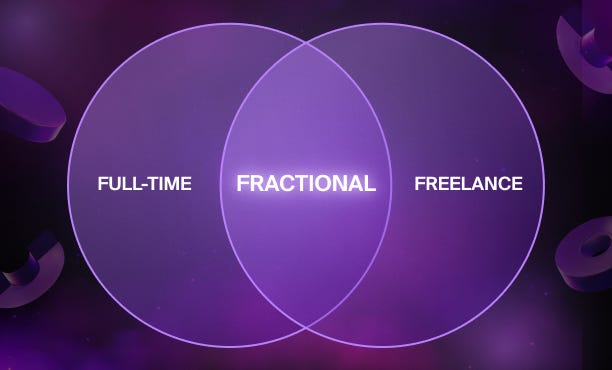
Corporate layoffs have created a surge of freelancers, swamping platforms and putting downward pressure on rates. Many more executives are trying Fractional Employment working part of their time for a company in a CMO or CFO role for example. Our article highlights some platforms for fractional work.
If you are looking for a new job, then AI can help too here are 20 Tools to Help You Land a New Job - from building your CV/resume to auto-applying for jobs.
Thinking about careers in 2025 and beyond requires a different mindset to the last century. One reason is that we are living longer and healthier ☺️, which gives employers and governments some challenges which we outline, in Living Better, Not Just Longer: Reinventing Work for the Silver Workforce. And for individuals we need to consider Planning for Non-Linear Career Trajectories.
Finally, we question whether we should be Retiring Retirement…
Anywheres 1 - 1 Somewheres
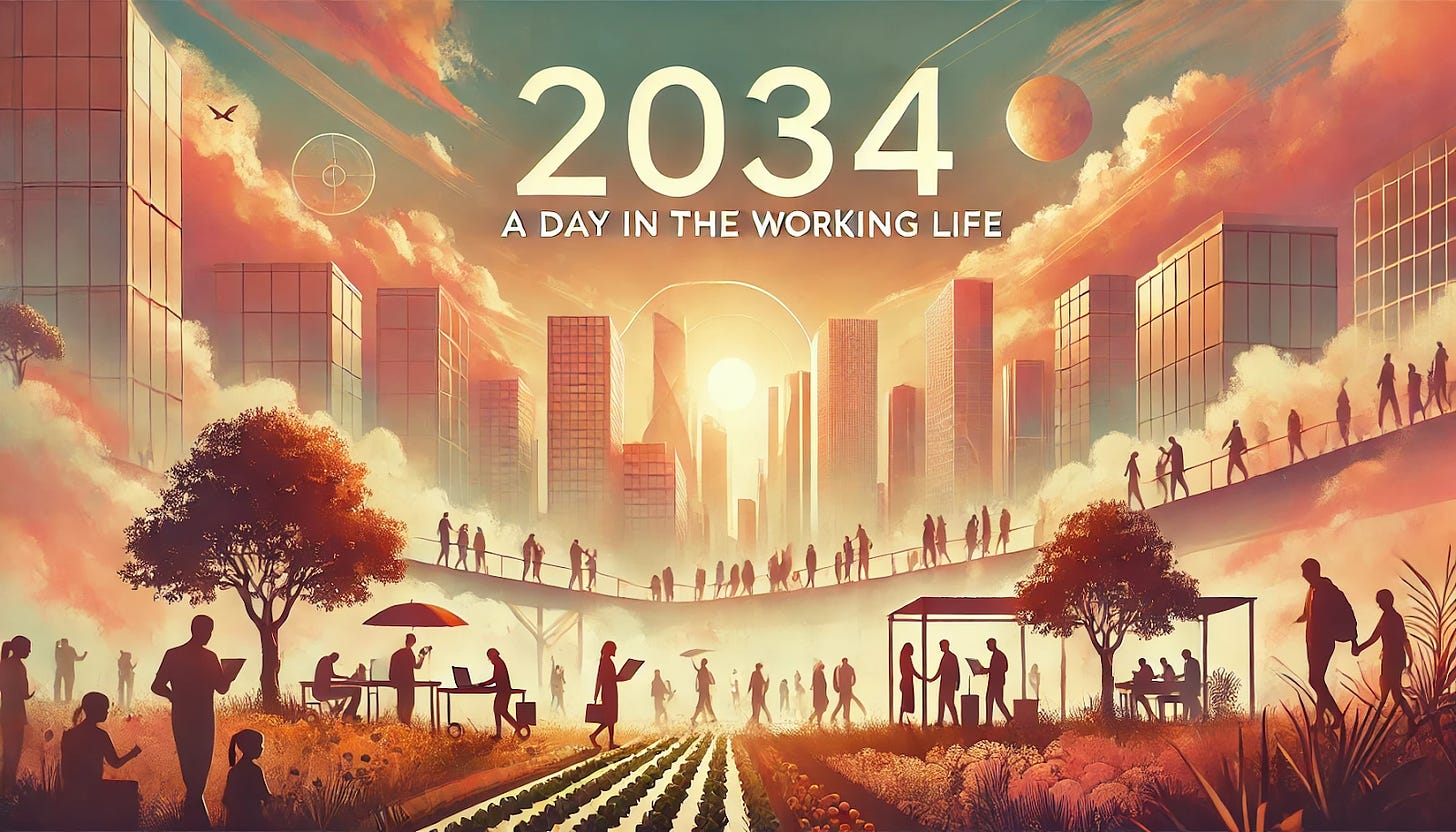
While remote work allowed some to thrive from bedrooms to beaches, other workers were firmly rooted locally working in supermarkets, hospitals and fields.
The main fault line in contemporary society, according to David Goodhart, is not between right and left, or capitalists and liberals. It’s between the people who see the world from Anywhere and the people who see it from Somewhere.
One thing that can help in the future is by redefining what a company is, in relation to the communities they evolve from.
And finally, we are transported from 2024 to 2034 – A Day in the Working Life. With equity tokens, lifelong learning wallets, and intelligent seamless work-matching platforms…a personal view on the future, which it turns out depends on your past.
Technology 1 - 0 Trust
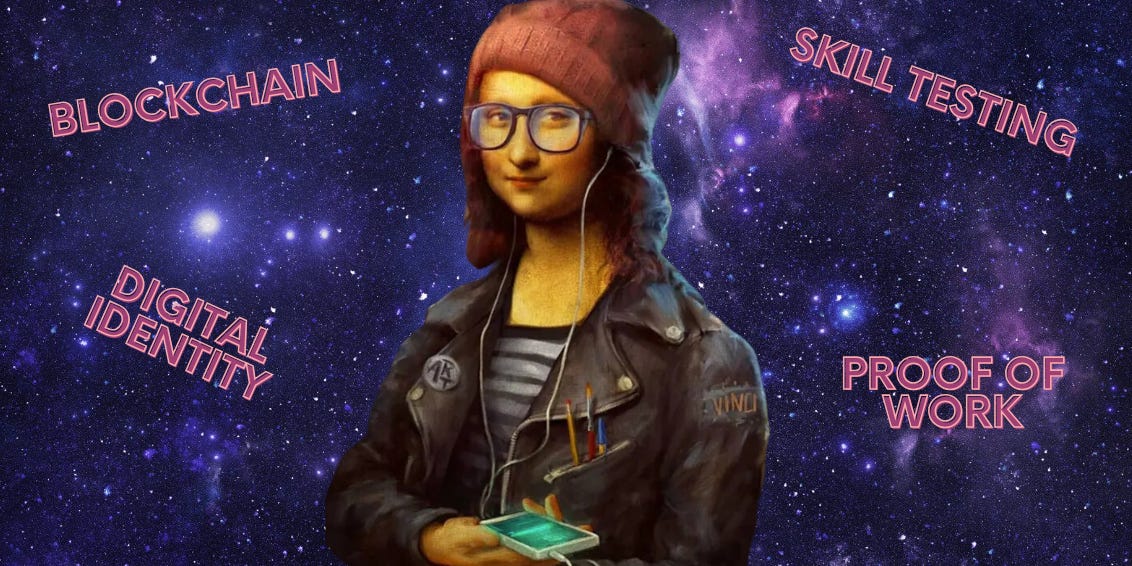
As apps and platforms took over some of our work functions, workers questioned whether their data and privacy were being treated ethically. Peoples’ tech preferences are now as passionate and specific as their food preferences. ChatGPT has become invaluable, but are we aware of the environmental and privacy downside? Matteo examines the impact of AI on mental health in AI Anxiety.
We suggest that technology will also enable us to kill off two old work tools that need to be in Room 102 in the Death of the CV and the keyboard in The End of Typing?
And what new technology means new practices, including the rise of Video - in the TikTokificaiton of Work.
Finally, a question, Is AI Truly Revolutionary? We give a 250 year perspective on tech disruption.
Centralised 0 - 1 Decentralised

Employers increasingly sought workforces that could flex with demand, leaning on freelancers and platforms over permanent employees.
What might a decentralised, and more equitable fairer world of work look like?
Reinventing Work for the Digital Golden Age – Five pathways towards a more inclusive and entrepreneurial future of work: from lifelong learning budgets to better work-matching infrastructure.
Office 1 - 0 Home

The return-to-office debate ended in a landslide for office landlords and corporate real estate, leaving remote work advocates out in the cold.
What was the real reason for RTO mandates, productivity, coffee machine chats, or trying to justify massive investment in corporate real-estate? Read Peak Office to find out - our 2nd most popular article of 2024.
And finally, by trying to include this photo of a proud peacock on the roofs of Lisbon in an article, I wonder whether we have heard The Last Call of the Corporate Peacock.
A Personal Note to Our 25,000 Subscribers
To everyone who subscribed, commented, shared, and engaged with us this year: thank you. You’re more than readers; you’re co-creators of this revolution in how we think about work.
Next year, we’ll be offering more opportunities to collaborate, network, and challenge outdated work paradigms.
If you are building a product or service that improves how we work let us know - we would love to see a demo.
Your Work3 and Workforce Futurist Team,
Andy and Matteo